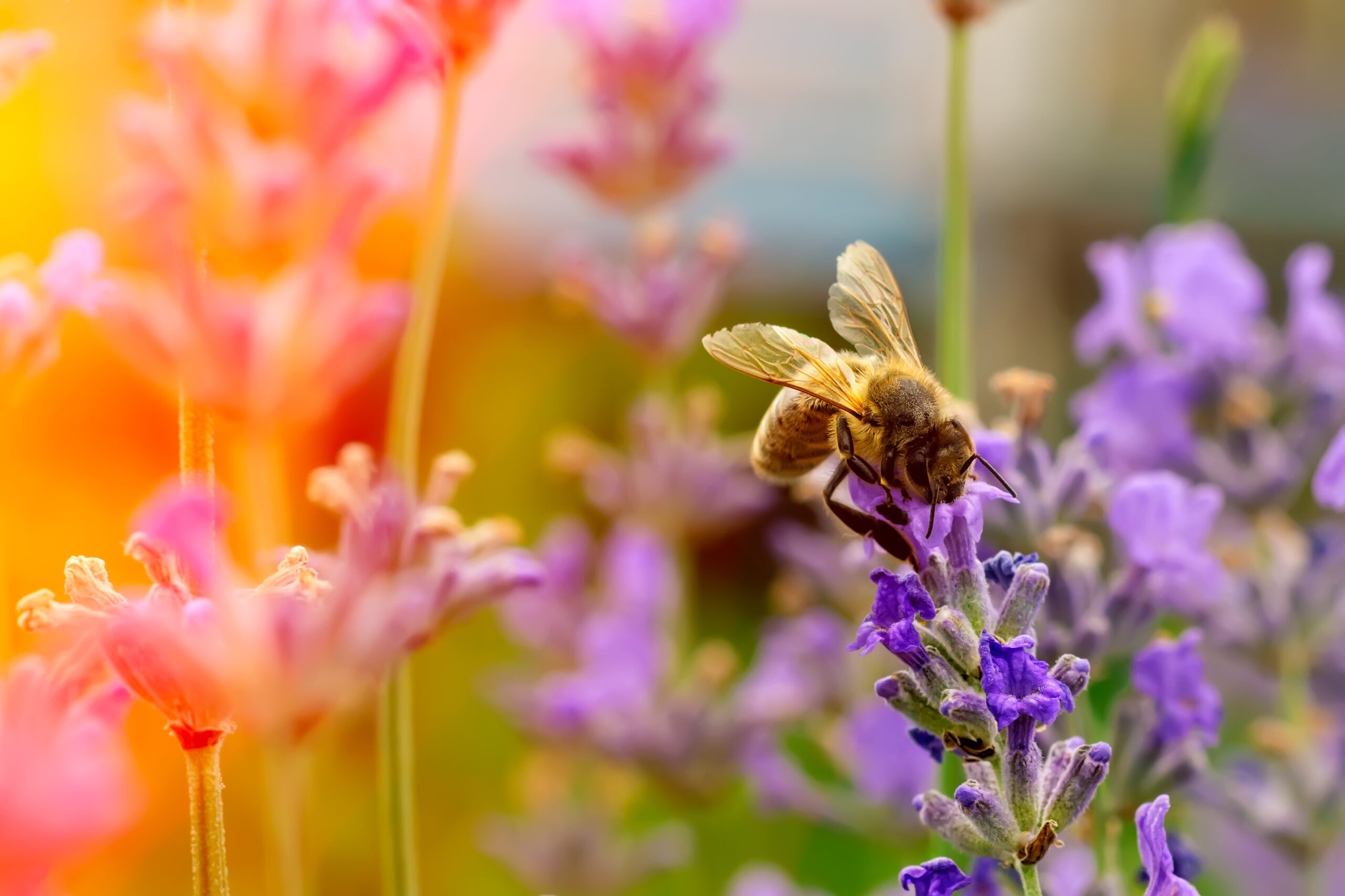Have you heard the buzz? Virginia Western Community College is a Bee Campus! We were officially designated a Bee Campus in 2023, and we’re the first VCCS campus to achieve this certification. We also have a student-run Bee Club AND we have beehives! Are you curious about bees? Are they actually THAT busy? Do they really live in hives of activity? Is it bad to have a bee in your bonnet? Is it good if something is “the bee’s knees”? For the answer to these and other burning (and very interesting) questions about our resident pollinators, join our swarm! Check out the wealth of information available here and in the resources linked, find out why you should care about these industrious (and critically important) bundles of energy, and discover how you can become involved in supporting our Bee Campus!
Program Overview & Information

Our college has always taken great pride in our beautiful campus green spaces, and through the high quality and thoughtful planning of our Horticulture Department and Landscape Facilities Management, our campus already met the requirements for Bee Campus status before we were even certified. We have a wide cross-disciplinary interest and support from our faculty, staff, and administration, and we are busy planning student events and community outreach.
About Bee Campus USA
Bee City USA and Bee Campus USA work to galvanize communities to sustain pollinators, in particular the more than 3,600 species of native bees in this country, by increasing the abundance of native plants, providing nest sites, and reducing the use of pesticides. Bee City USA and Bee Campus USA are initiatives of the Xerces Society for Invertebrate Conservation.
About Native Pollinators
Bees transfer pollen between flowers, enabling the incredible diversity of plants on our planet to fruit and reproduce. Pollinators are keystone species in essentially every ecosystem on earth, facilitating the reproduction of over 85 percent of all flowering plants and over two-thirds of agricultural crops.
In addition to the domestic honey bee (Apis mellifera), a species brought to North America from Europe, there are more than 3,600 species of bees native to the United States. These wild bees are generally quite different than the domesticated honey bee-most of them live solitary lives, with a single female doing all of the work to build a nest, collect pollen and nectar, and lay eggs.
Unlike the honey bee, which nests aboveground and can be managed in wooden hives, more than two out of three wild bees live underground in nests that can be hard to spot from the surface! Some dig down and lay their eggs several feet below ground, while others make nests near the soil surface or in hollowed out plant stems above ground. While bees are the most important pollinator, butterflies, moths, beetles, flies, wasps, and hummingbirds also contribute to pollination.
Research has shown significant declines in native pollinator population sizes and ranges globally with up to 40 percent of pollinator species on Earth at risk of extinction in the coming years as a result a variety of environmental stressors including habitat loss and degradation, exposure to pesticides, diseases and pathogens, and climate change.
Bee Campus USA Commitments
- Establish a standing Bee Campus USA committee.
- Create and enhance pollinator habitat on campus by increasing the abundance of native plants and providing nest sites.
- Reduce the use of pesticides.
- Offer courses or continuing education opportunities that incorporate pollinator conservation.
- Offer service-learning projects to enhance pollinator habitat.
- Display signage focused on pollinator conservation.
- Maintain an online presence for Bee Campus USA activities.
- Annually apply for renewal and report on the previous year’s activities.
Visit https://beecityusa.org to learn more.
Activities
Visit Virginia Western’s beautiful Community Arboretum! Events and more can be found on their website: https://www.virginiawestern.edu/arboretum/
Meet Our Bee Campus Committee
Committee Chair and Co-Chairs
Chair: Heather Butler (hbutler@virginiawestern.edu)
Co-Chair: Tonya Judd (tjudd@virginiawestern.edu)
Co-Chair: Jenifer Kurtz (jkurtz@virginiawestern.edu)
Our Cross-Disciplinary Committee Members
- Clark BeCraft, Horticulture
- Chet Bhatta, Biology
- Annette Chamberlin, History and Social Sciences
- Mark Cohen, Facilities Management
- Karin Cole, School of STEM
- Melanie Crouch, Computer Science
- Craig Harris, Campus Police
- Shelley Lyons, Institutional Advancement
- Adam O’Neal, Associate Dean of STEM
- Toni Pepin, Biology
- April Rigney, School of STEM
- Jeff Scott, Computer Science
- Ruth Sherman, Math
- Amy White, Dean of STEM
- Mallory White, Biology
- Kevin Witter, Facilities Director
- Diane Wolff, Computer Science
How Can You Help?
Please Support Virginia Western’s Bee Campus Educational Events and Community Outreach!
Would you like to support our Bee Campus initiatives, protecting our pollinators, and growing a better community? Your support will make a real difference in improving the landscape for a busy, bright and healthier community. Your program gift will create and provide educational materials, training and community outreach, research initiatives, hive maintenance and repairs, disease management, bee feeding and nutrition, and safety and other essential gear. Donating is as simple as following this link.
Integrated Pest Management (IPM) Plan
The purpose of this integrated pest management (IPM) plan is to guide the use of environmentally sensitive pest management strategies and least-toxic control methods at Virginia Western Community College (hereinafter referred to VWCC) to enhance the health and safety of campus landscape users and protect the environment. Click here to view the Integrated Pest Management Plan. (PDF)
Student Bee Club
Interested in bees, pollinators, and joining an active student club on campus? Join us and check it out! Events for our Fall Semester are listed below:
- Weekly Club Meetings: Every Thursday, 2-3PM, STEM ST216
- Bee Club Bake Sale: Wednesday, October 15th, 10AM-1PM, Student Life Center
- Volunteer for Roanoke GoFest: Friday-Saturday, October 17th-18th.
Connect With Bee Campus USA
Pollinator Conservation Resources
Bee Campus USA Resources:
Other Resources

